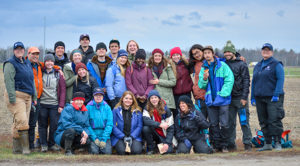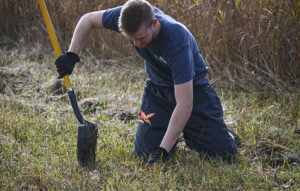The Natural Edge Project
Agricultural Streambank Naturalization in the Muskrat Watershed
 In spring 2018, Watersheds Canada partnered with the Muskrat Watershed Council (MWC) and Applied Research at the Pembroke Campus to undertake the monumental task of planting 45,000 native trees and plants over three years along agricultural streambanks and shorelines in the Muskrat Watershed. This is supported by Watersheds Canada’s Natural Edge Project.
In spring 2018, Watersheds Canada partnered with the Muskrat Watershed Council (MWC) and Applied Research at the Pembroke Campus to undertake the monumental task of planting 45,000 native trees and plants over three years along agricultural streambanks and shorelines in the Muskrat Watershed. This is supported by Watersheds Canada’s Natural Edge Project.
The Natural Edge Project aims to re-naturalize shorelines using native trees, shrubs, wildflowers, and grasses. The use of native plants ensures that natural ecosystems are enhanced and shorelines are stabilized using the species that are best suited to tolerate the local environmental conditions.
The goal of this project was to focus on restoring agricultural streambanks, rather than lakefront shorelines, in order to stabilize streambanks, reduce erosion and sedimentation, and offer new habitat for wildlife and fish. The new trees and shrubs will also help absorb excess nutrients and prevent them from entering adjacent streams, which causes problematic algae growth commonly seen in the Muskrat Watershed, particularly in Muskrat Lake.

Students from different academic programs at the Pembroke Campus participated in the plantings. In addition, Applied Research summer co-op students assessed each property and developed planting plans for the property owners prior to the fall plantings. In September 2019, students from the Environmental Technician Diploma Program also conducted water quality testing for each of the planting sites.
To date, a total of 30,000 trees and shrubs have been planted. October 2021 will see the completion of this large-scale planting project, though the Muskrat Watershed Council is currently seeking new funding to continue the project.